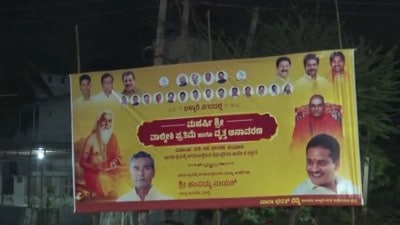Sudershan speak
Dussehra not only marks the beginning of the festival season -- a time characterised by joy, gaiety and rejoicing with one and all -- but ...

Dussehra not only marks the beginning of the festival season 8212; a time characterised by joy, gaiety and rejoicing with one and all 8212; but also symbolises cultural pluralism: while it is Durga Puja for the Bengalis, it is the denouement of the Ram Lila for those from the Hindi heartland. Rashtriya Swayamsevak Sangh chief K S Sudershan certainly chose an inappropriate occasion, when during a Dussehra rally in Nagpur, he asked Christians to free themselves from the clutches8217; of foreign churches to set up a Swadeshi church.8217; It was certainly the most un-Dussehra like statement: neither festive, nor pluralistic. The central problem of narrow-minded nationalists is that they do not understand the universality of religion and diversity of cultures. While nation states and nationalism are hardly a few centuries old, most religions and cultures predate even the last millennia. In the case of this country, while Indian nationalism arose as an antithesis of colonialism only in the last century, most Indian religions,whether Hinduism, Islam, Christianity or Buddhism are several centuries old. For someone like Sudershan, who was born into Sanatan Dharma, the eternal quality of religion should not come as a surprise.
If Sudershan could have seen the logical outcome of his argument he would have realised that it is like a leader of the moral majority lecturing to Hindus of the Indian diaspora in the United States: free yourself from the clutches of foreign temples by setting up an Uncle Sam-style temples.8217; Sounds not only ridiculous, but downright stupid, doesn8217;t it? Sudershan should have known better before making such an insensitive statement. At a time when the Bharatiya Janata Party under the leadership of Prime Minister Atal Bihari Vajpayee and its first Dalit president Bangaru Laxman is trying to woo Scheduled Castes, Scheduled Tribes and all minorities, Sudershan8217;s statement is like a bolt from the blue, designed to harm rather than strengthen the Sangh Parivar8217;s interests. Yet, instead of criticising Sudershan, some BJP leaders have gone ahead and defended him. In fact, BJP leader J P Mathur only rubbed salt into the wounds, when he added: quot;We believe that the Indian Christians are capable of spreading JesusChrist8217;s message across the country. They need not seek the help of foreign missionaries.quot; It is precisely this pro-minority, anti-minority signals emanating from different sections of the Sangh Parivar which make most people doubt the very intentions of its leadership and the very purpose of its various organisations.
It comes as no surprise that most church leaders have taken umbrage at Sudershan8217;s suggestions. They are understandably peeved at the fact that the indigenous churches8217; notion is much more than merely attempting to nationalise religion. They see this quot;innocuous-sounding callquot; as a plot to restrict freedom of minorities and to fuel suspicion that non-Hindus are somehow un-patriotic. And they are right insofar as patriotism is not the monopoly of any religion. While religion and culture, the Sangh Parivar leaders must realise, are in the private domain, politics is in the public domain. And politicians who have failed even the basic test of governance, have obviously no business interfering in the private domain.
- 01
- 02
- 03
- 04
- 05































